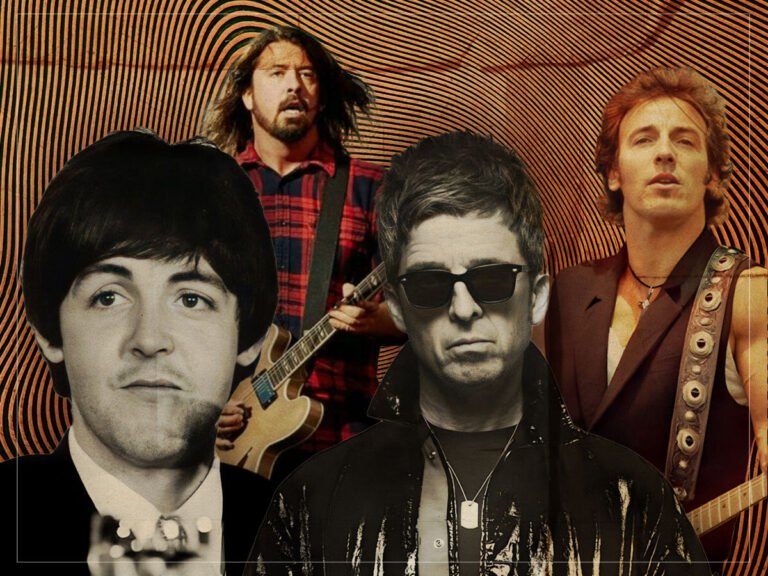‘The One’ – Foo Fighters

Foo Fighters were never known for being the most underground band of all time. They had already been above ground before they had even started once people heard that Dave Grohl was working on a new project, so the idea of them coaxing by the same way REM had for the first half of their career didn’t make too much sense. But when the hits started rolling in, Taylor Hawkins figured there was no excuse for them to sell out as hard as they did for Orange County.
Even if the band was friendly with Jack Black and even had him cameo in a handful of their videos, ‘The One’ was the first time Hawkins felt that they made something that felt forced. As opposed to the carefree vibe of There Is Nothing Left to Lose, this feels like the band having the basic idea for a hook and never really fleshing it out that much, especially with how awkward the chorus is structured.
Foo Fighters were still miles ahead of whatever post-grunge was on the radio, but this proved that whatever Grohl was doing with pop music had diminishing returns. It managed to get them on the radio, but if you think about how little the band actually played the song live, you have to wonder at what cost did it take for them to work up something they could have made in their sleep.

The story of Styx as we know them today is a lot different than the one that started back in the 1970s. While they have never been a hit with the critics, no matter which era they were in, they always had the power to get audiences in venues, whether that was hearing Tommy Shaw singing ‘Renegade’ or having everyone harmonise on ‘Come Sail Away’. There was a central problem in the band, though, and that problem’s name was Dennis DeYoung.
Despite being the group’s founder, DeYoung started to demand total control over everything the group was doing, including making one concept record after the next. Right when they were getting burned out on telling a story on every album, the idea of them living in a creative headspace where they had to sing about anti-rock and roll robots was enough for everyone to tap out on Kilroy Was Here.
Even though the band has acted like this album doesn’t exist for years now, ‘Mr Roboto’ still stands as the most mystifying piece of their career, complete with prog-rock keyboards, synth textures, and the most bug-nutty attempt at a story they have ever made. Any great rock band have made people stand in awe of how cool they are, but even Styx knew that the middle schooler’s attempt at a rock and roll redemption story didn’t have that much staying power.

It’s impossible for any artist to keep comparing themselves to how they were in their 20s. Even if the music industry insists that artists continue to act like they are 25 for the rest of their lives, there comes a point where everyone is going to want to either move on or start taking their music in different directions. And when Lorde came up for air, she realised that she had a bit of a touch-and-go relationship with the song that made her a star.
Then again, there’s nothing necessarily wrong with ‘Royals,’ either. Since everyone and their mother was making pop songs about getting messed up in a club circa 2013, hearing someone sing about being proud of where they come from and not having to take the cheap tunes on the radio was already a breath of fresh air, but looking back on it now, it can sound a little brow-beating coming from someone who has been a veteran of the game at this point.
And looking back on her greatest hits since then, Lorde has never been one to shy away from pop, either, even making some of the greatest material of her career by embracing mainstream sounds like on Melodrama. Anyone could have spent their time complaining about the pop charts, but as she would find out, making the pop charts better with your own material is the best revenge.
‘Lucky Town’ – Bruce Springsteen

There was never a single word that came out of Bruce Springsteen’s that his audience didn’t believe in. Even though a lot of his songs could get too wordy for some people, the main reason why ‘The Boss’ worked so well was because his songs were about the average man on the street, always making sure to never get too far away from those Jersey beginning that he grew up on. That’s a hard life to write about, so when Springsteen started getting happy, things went south pretty quickly.
Because the best Springsteen songs are about finding some sort of spiritual redemption during hard times, and ‘Lucky Town’ is one of many songs on the album of the same name that’s coming from someone who’s never experienced a bad day in their lives. Even though it was nice to hear Springsteen sounding happy should be a good thing, his whole appeal was based on struggle, so hearing someone with no problems was enough for people to turn their back on him.
And out of all the albums he ever made, this was the first one Springsteen publicly acknowledged was a dud, saying from the podium at the Rock and Roll Hall of Fame that he knew the public wasn’t too much of a fan of that side of his career. But life shouldn’t be about reflecting on being sad all the time, and with The Rising, Springsteen knew that the best way forward was telling the stories that other people didn’t get the chance to.
‘Earlybird’ – Eagles

In the world of Eagles, Don Henley and Glenn Frey being described as perfectionists would be an understatement. They made sure that everything they ever put out was good enough to be a hit, and if someone came in with something subpar, it wasn’t out of the question for it to be rejected completely. When they were figuring it all out, though, Henley admitted to letting some band members off the hook more than he should have.
It’s hard to get too worked up about the band’s debut all that much, but in between the great tunes comes ‘Earlybird’, which is a bit more goofy than what they had done before. Although the entire record has the vibe of hitting the road to the desert and having trippy cowboy fantasies, Henley remembered having a less-than-pleasant reaction listening back to it, especially hearing the corny bird sounds at the top of the tune.
If anything, this was the kind of gimmick that the band were fighting against, and it was no surprise that the band made a cowboy-rock opera one record later on Desperado. That album might have bitten the dust pretty quickly after it came out, but the message was clear: this was a band worthy of being taken seriously.
‘The Fountain of Lamneth’ – Rush

Rush has always been the least apologetic progressive rock band in the world. No band that relied on massive 20-minute songs were looking to reach the hit parade, but even by critics’ standards, the Canadian rock trio were still among the most reviled band in history and could not give two shits about it. However, there’s a difference between when the critics don’t get it and when fans stop showing up to concerts.
Although Fly By Night set them up nicely with Neil Peart behind the drum kit, Caress of Steel was an example of them trying to do too much too soon. They had already become experienced players, but when they decided to make an entire side of their album based around a mythical journey of the stupidest story imaginable, it came as no surprise when both their fans and fellow musicians didn’t get it.
Whereas Rush usually moved on to the next phase of their career without batting an eye, each of them knew enough to say that they shouldn’t make that kind of record again, with Geddy Lee claiming they were too high to realise what they were doing. They were certainly capable of making something unprecedented, but looking at what they did later on Hemispheres, this was the equivalent of trying to ride a motorcycle when barely getting passed using training wheels on a bike.
‘My World’ – Guns N’ Roses

Every band has to deal with someone taking the reins a bit more than the others. There has to be some sense of leadership in any band, and even if not everyone is in agreement, it’s best to have the group’s best interests at heart instead of trying to make it all about yourself. While that means dealing with a few nasty moments behind the scenes, Axl Rose made the kind of track worthy of making members of Guns N’ Roses leave out of spite.
Granted, it’s hard not to see Use Your Illusion as Axl Rose solo outings half the time. He was the one responsible for taking them into new directions, but whereas everyone was comfortable with lean, mean rock and roll, bringing in the industrial synths towards the end of the experience was like a splash of cold water. Izzy Stradlin had been working closely with Rose through the years, but the minute he heard what he stuck on the end of the record, he could see the writing on the wall.
This was slowly becoming Rose’s band, and since he no longer had a say, Stradlin could tell it was time to go to new places, eventually sobering up on the road and leaving the group halfway through the tour for the albums. While rhythm guitarists can come and go in any band, this should have been the first sign that maybe Rose was steering them in the wrong direction in some places.
‘Bip Bop’ – Paul McCartney

The year is 1970. The Beatles have come to an end and Paul McCartney is finally left to his own devices for the first time since he was barely out of his teens. There’s no set way to start all over from scratch, but even if critics ridiculed RAM for all the wrong reasons, Macca realised that they had a point when looking at when he had a bunch of friends jam for the hell of it on Wild Life.
Granted, I don’t want to be too nasty to this one. McCartney is still settling into his groove as the leader of this new band, but ‘Bip Bop’ is the goofiest song that he ever wrote, and that’s coming from the same mind who brought us ‘Ob La Di Ob La Da.’ Compared to the Little Richard freakout on ‘Mumbo,’ ‘Bip Bop’ feels like a piece of gibberish that McCartney scrawled together in fifteen minutes while stoned and turned into a five-minute song.
Even though there is some meat here for a decent bridge or chorus of a song, all Macca can think of is making it into a blues, eventually saying that he wished he could take the song back. It might give listeners a nice insight into what Wings’ first years were like, but chances are McCartney wants to pack this one up and make sure no one has to suffer through it ever again.
‘Sunday Morning Call’ – Oasis

There’s a good chance that Noel Gallagher entered the 2000s with a bittersweet feeling. Even though Oasis had done everything they had set out to do in the 1990s, it felt like the rug had been pulled out from under them by the time they got around to making Standing on the Shoulder of Giants. Bonehead and Guigsy had come and gone, and all that was left of the greatest band in the world was Noel singing a song that could practically be prescribed as a sleeping aid.
While most of Oasis’s fourth outing is relatively downtempo, ‘Sunday Morning Call’ is where Noel couldn’t even take the bullshit he was selling people any longer. ‘Where Did It All Go Wrong’ at least had some punch behind it and a powerful message about the end of the band’s prime, but this is the equivalent of him spouting off different philosophical messages that don’t connect to anything. That may have worked on ‘Champagne Supernova,’ but that song at least had the best melodies of Noel’s career.
And despite being able to do whatever he wanted for the best-of collection Stop The Clocks, Noel made it a point to remove ‘Sunday Morning Call’ from any other greatest hits collections. It does appear as a hidden track on the singles album Time Flies, but it takes a special kind of hatred when you can’t be bothered to even look at the song if it comes up on the track list for an album.
‘Run For Your Life’ – The Beatles

John Lennon was never one to toot his own horn when it came to the best stuff he’s ever made. The entire process of being in The Beatles had made him jaded about his own work, and whenever he looked back at his masterpieces, all he felt was a tinge of regret of what could have been. He could have taken ‘Strawberry Fields Forever’ even further, he could have made ‘I Want To Hold Your Hand’ punchier, but nothing was going to save ‘Run For Your Life’ no matter how he tried to spin it.
Even though Rubber Soul marks the moment when the Fab Four started moving past the typical love song, its closing track feels like a huge step backwards. If everyone was pissed to hear the plaintive sounds of ‘Yesterday’ be interrupted by ‘Dizzy Miss Lizzy’ on Help!, this is even more egregious, with all of those mature love songs being replaced by a tune that sounds like it was written by a jealous boyfriend.
Lennon may have a sour opinion on many of his classics, but he repeatedly held up ‘Run For Your Life’ as one of the worst songs the band ever made. The sonic textures are certainly there, and Lennon does at least play up that vindictive persona pretty well, but considering this was coming off the same album that gave us songs like ‘In My Life’ and ‘Norwegian Wood,’ looking at this song closing out everything is like watching an evolution chart in reverse.





